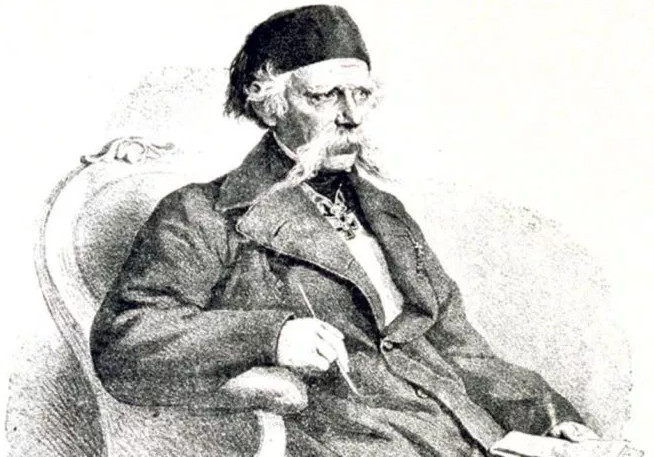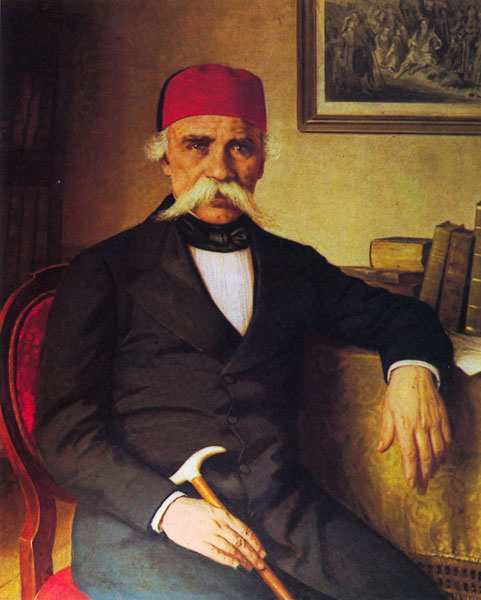Vuk Karadzic
November 6 this year marks the 234th anniversary of the birth of Vuk Karadzic, a man responsible for the reform of the Serbian (national) language and script that we still use today. In this text, in addition to the significant events that led to Vuk Karadzic representing what he represents in Serbian history nowadays, we share with you one little-known interesting fact about the most important person in Serbian literature of the 19th century.
Given the high mortality of children in the late eighteenth and early nineteenth centuries, Vuk Karadzic was also one of many children from the marriage of Stefan and Jegda Karadzic. The situation with child mortality did not change significantly when Vuk Karadzic started his family with Ana Maria Kraus - two of them had a total of thirteen children, of whom only two outlived their parents.

It is not surprising, therefore, that Vuk Karadzic's early life was permeated with diseases that hindered his desire to acquire his education in the way it is intended. Moreover, during his childhood and early youth, Vuk Karadzic was more often rejected than accepted in schools. Thus, for example, the Karlovac High School rejected him because of his "age" when he was 17, but he found solace in Dositej's school a little later. However, again due to illness, Vuk fails to finish Dositej's school as well. The lack of education in the formal sense did not influence Vuk Karadzic to give up on his vocation. Vuk Karadzic was a regular in the editorial office of "Novina serbskih", for which he wrote a never-published article about the fall of Serbia. This article will play an important role a little later, when Vuk Karadzic goes to Vienna. This article will attract the attention of Jernej Kopitar - the then main authority for Slavic languages of that time. Jernej Kopitar will play a significant role in supporting and mentoring Vuk.

source: wikipedia.org
The second decade of the 19th century is the most important for the "creation" of Vuk we know today. More precisely, in 1814, Vuk Karadžić published a book of mostly lyrical poetry called "Mala prostonarodna slaveno-serbska pjesnarica". Vuk's enthusiasm for the vernacular drew him to the side of literature, but at the urging of Kopiter, in the same year Vuk collected and published the grammatical rules of the vernacular called "Pismenica serbskoga jezika". A year later, he published a new collection of folk songs called "Narodna srpska pjesnarica", and in 1818 the "Serbian Dictionary" saw the light of day - perhaps the most significant contribution of Vuk Karadzic. This was the first book written in the reformed, Vuk's Cyrillic alphabet, and it contained 26,270 words.
However, despite these published books, Vuk Karadzic has been challenged both in Serbia and abroad. It took an additional thirty years for his intentions to become generally accepted. The year 1847 is the year that is nowadays called the "year of Vuk's victory". The victory refers to the acceptance that the vernacular is the only real language of the Serbs. The final reform of the Serbian vernacular was crowned with the printing of four works: a translation of the "New Testament", poems by Đuro Daničić, Njegoš's "Mountain Wreath" and Vuk's "War for the Serbian Language and Spelling".

source: wikipedia.org
As for the interesting facts from the life of Vuk Karadzic, it is mostly mentioned that Vuk Karadzic took part in the First Serbian Uprising, that he was the mayor of Belgrade for a year, or that he had 13 children. However, the history of art also knows a different Vuk Karadzic, about whom not much is said. For example, in his book "For the Love of the Fatherland", Vladimir Simić mentions one not so great Vuk's habit, which in the long run had a positive effect on the preservation of Serbian heritage. Namely, considering that Vuk was a frequent guest of Serbian monasteries, he often received monastic writings as a gift. Vuk was aware of the material value that these writings carry, so he often knew where and to whom to sell them in Austria and Germany in order to support himself. But Vuk Karadzic did not just receive writings as a gift; he often knew to steal pages or entire writings from the monastery, which he would then either keep or sell. Although this behavior is to be condemned, it turned out that in the long run this dishonorable act is responsible for the preservation of many medieval writings, having in mind the turbulent history in which entire monasteries with their respective libraries disappeared in flames. It is estimated that during his lifetime, Vuk Karadzic was in possession of over 5,000 documents, of which about half were preserved in his possession, while others being preserved elswhere. Later, a large part of Vuk's possessed writings was kept in the National Library, until it was razed to the ground during the Nazi bombing in 1941.












